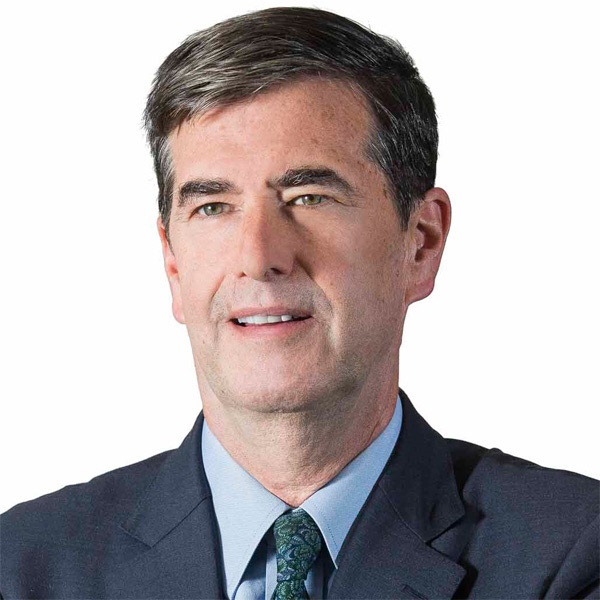Matt Reynolds - In this episode of Capital Ideas we'll hear from portfolio manager Steve Watson who has been investing in global stocks for 35 years, the last 23 of them while living in Hong Kong. In this discussion Steve will recall investing through 23 market downturns in his 35 years and how his contrarian instincts have shaped him as an investor. Steve also explains why he thinks it's important for investors to develop a persona and stick to it.
I'm your host, Matt Reynolds. Let's get into it.
Matt Reynolds - Steve, welcome to Capital Ideas Australia podcast.
Steve Watson - Thanks so much, Matt. Great to be here.
Matt Reynolds - So you've recently marked your 35th anniversary as a professional investor. Obviously, a long span of time with many ups and downs and many experiences. I wonder if you could start us off just by sharing some of the most shocking changes, momentous events that highlight your career for you.
Steve Watson - Great. Thanks. You know, I was just thinking, I'm kind of taken aback by the fact that it's been that long. I realized that my start in this business was closer to the Korean War than today is to my start in this business. It has been a real journey.
Matt Reynolds - Yea, wow.
Steve Watson - And I have been thinking about what it was like when I started in the business back in 1987, no voice mail, no phone mail, no email, no internet. Russia was still part of the Soviet Union. There was no euro. There was no Google. There was no Amazon. It's just amazing to think how much life has changed across that span of time.
Matt Reynolds - So Steve, how many downturns have you experienced in your career?
Steve Watson - You know, I've tried to keep a list. I think we're kind of around 23 of them this year, which means that basically once every year and a half something has come along to disrupt the markets. It's change, disruptive change, negative change, it's kind of been a constant across that period.
Matt Reynolds - So maybe you could share with us some of the wisdom you've picked up by living through difficult periods and market downturns.
Steve Watson - Yeah, I guess what I would say is that maybe my most fundamental feeling is that whatever is going on, this too shall pass. The tough times give way to better times and then the better times give way to tough times. We recover, and that's true of life, that's true of the markets as well. And along the way I've come to the feeling that it's just not really worth it to try and time things.
Our search for value is a constant. We're always weighing, we're always judging, we're always looking for value. And the attempts that I may have made along the way to be clever about timing, just really haven't paid that well.
Matt Reynolds – Steve, so you're a well-known contrarian investor. Maybe you can share a little bit about your view and what helped form that disposition over time.
Steve Watson - You know, Matt, when I started in the business, I started with a firm that led me to take a dividend-driven approach. And so that helped me come to the conclusion that companies do have an intrinsic value. It's about the cash flows they'll be able to generate in the future, the dividends they'll be able to pay. And obviously that value proposition, that cash generating ability, does shift over time with changes in fortune, changes in the economy, changes in the business. But it's the movement of share prices that tends to move a lot more around that fundamental value. And those big swings in share prices are propelled by changes in sentiment around theoretical fundamental value. So that's kind of where I have landed as an investor. I try and develop a sense of fundamental value and then develop where the market is excessive in its negativity or its positivity around that core fundamental value.
Matt Reynolds - So that's great. So that gives a lot of opportunity to get invested in you know, fascinating companies and interesting stocks. Maybe you could share with us your views on where we are today. It's the end of 2023. Maybe share how you're thinking about investing today. I mean, this year, markets have been some might say surprisingly strong. Users been less bad than it may have been expected. We've seen maybe even some exuberance in markets so far this year. How are you thinking about investing today and looking at it?
Steve Watson - You know, I'm not, that surprised at the strength of the market, but I have been very surprised at the narrowness of the market. It doesn't surprise me so much that enthusiasm has returned, but it has surprised me that appreciation of the potential for equities has been so channelled into, we refer to the magnificent seven in the US. It's frequently tech related companies, internet driven companies, companies with very large market capitalizations, a relatively small number of businesses. And I'm surprised not only that it's happened, but it's that it's happened again because we saw that in 2021 lasting into 2022. And then 2022 seemed to me a year where the markets were coming back to more of an appreciation of fundamental value, an appreciation of cash flows and dividends. And now here we are, we're back in a market that really rewards growth these stocks because of lower interest rates, because the market has been interested in very large and liquid companies, perhaps as a safe harbor, and also because of the focus of markets on artificial intelligence, which obviously has favoured tech and internet companies.
So, I think we have seen something of a broadening of return in the market. I think we can see more of that going forward.
Matt Reynolds - Right. So, some stocks are up a long way this year. Do you have a sell discipline? I mean, when do you know when it's time to sell?
Steve Watson - I guess I'd step back a little bit and say I'm trying as a seller and as a buyer just to be a little slower, a little more willing to sit on my hands, to be more measured. And so, I guess part of that is an understanding that as markets swing, as I've said, from excesses of pessimism to excesses of optimism, they often will overshoot, they'll go a long way. And so, I'm just trying to slow down a little bit, to be careful. Not to make hasty judgments, not to assume that the market understands everything the way I understand it, when I understand it. An example of that was in the advent of the global financial crisis. So, in 2007, I thought the global economy was heading towards a very bad outcome when I looked at overbuilding in properties, not only in the U.S., but in many parts of the world.
And then when bank stocks started to weaken in 2008, I said, aha, see, the world is understanding what I have understood, what a number of us at Capital had understood. I should have sat on my hands more than I did because the bottom for financials didn't really take place until those very dramatic days in March of 2009. So, I'm trying to say, look, I'm right. We were right. There's been a large move in shares, but I don't have to act precipitously. I don't have to act right away.
Matt Reynolds - So I sense that, you know, one's investment approach always seems to be evolving to some degree. What advice would you give to your younger self?
Steve Watson - I think it's, it is something that I figured out, but it took me a while to figure, uh, figure it out. And that is you, we, one really needs to learn to figure out who one is as an investor. What is your investing persona? Decide what works for you. Decide how your mind, your brain, your personality drive you to make investment decisions. Understand that person and then be true to that person. Don't look to emulate someone else. Learn from other people. Don't try to be another person. Be yourself.
Matt Reynolds - I think that sounds like great advice.
Matt Reynolds - Final question for today. What's your favourite part of your job and why?
Steve Watson - You know, before I came to this job, before I came to the Capital Group, I had a tendency to get bored at work. And for that reason, I had never held a job for more than three years. And now I've been in this one for more than 33. Why is that? Because this is a job that never gets boring. I'm always learning, I'm always challenged, I always wake up with a portfolio that's changing and is different from the way it was when I went to sleep. That can be a little frustrating because it is like a puzzle that you never complete, but it keeps me busy, keeps me on my toes and I'm always ready to learn new things in this job. So, love the stimulation, love the challenge. I love doing well. I'm not so happy when I'm doing less well, but I always keep at it. So, keeps me stimulated.
Matt Reynolds - Well, that might be a great place for us to stop. Steve Watson, thanks so much for joining us today on the Capital Ideas program.
Steve Watson - Thank you so much Matt. It's been fun.
Matt Reynolds - We're always trying to get better, so if you have any feedback, including topics you'd like to see addressed in future episodes, send us an email at CapitalIdeasPodcastAustralia@capgroup.com. And if you like what you heard today, please follow us on your favourite podcast platform.
For Capital Ideas, this is Matt Reynolds reminding you that the most valuable asset is a long-term perspective.
Legal and regulatory information
The information included on this site is neither an offer nor a solicitation to buy or sell any securities or to provide any investment service. Past performance is not a guarantee of future performance. Statements attributed to an individual represent the opinions of that individual as of the date published and may not necessarily reflect the view of Capital Group or its affiliates.
While Capital Group uses reasonable efforts to obtain information from third-party sources which it believes to be reliable, Capital Group makes no representation or warranty as to the accuracy, reliability or completeness of the information.
The information included on this site is of a general nature and does not take into account your objectives, financial situation or needs. Before acting on any of the information you should consider its appropriateness, having regard to your own objectives, financial situation and needs.
In Australia, this communication is issued by Capital Group Investment Management Limited (ACN 164 174 501 AFSL No. 443 118), a member of Capital Group, located at Suite 4201, Level 42, Gateway, 1 Macquarie Place, Sydney NSW 2000 Australia.
All Capital Group trademarks are owned by The Capital Group Companies, Inc. or an affiliated company in the US and other countries. All other company and product names mentioned are the trademarks or registered trademarks of their respective companies.
© 2023 Capital Group. All rights reserved.
 Matt Reynolds
Matt Reynolds
 Steve Watson
Steve Watson